Related Research Articles
Telecommunications is one of the most modern, diverse and fast-growing sectors in the economy of Ukraine. Unlike country's dominating export industries, the telecommunications, as well as the related Internet sector, remain largely unaffected by the global economic crisis, ranking high in European and global rankings.

The Black Sea Fleet is the fleet of the Russian Navy in the Black Sea, the Sea of Azov and the Mediterranean Sea. The Black Sea Fleet, along with other Russian ground and air forces on the Crimean Peninsula, are subordinate to the Southern Military District of the Russian Armed Forces. The fleet traces its history to its founding by Prince Potemkin on 13 May 1783 as part of the Imperial Russian Navy. The Russian SFSR inherited the fleet in 1918; with the founding of the Soviet Union in 1922, it became part of the Soviet Navy. Following the collapse of the Soviet Union in 1991, the Black Sea Fleet was partitioned between the Russian Federation and Ukraine in 1997, with Russia receiving title to 82% of the vessels.

The Ukrainian Navy was the maritime forces of Ukraine and one of the five branches of the Armed Forces of Ukraine.

An unmanned surface vehicle, unmanned surface vessel or uncrewed surface vessel (USV), colloquially called a drone boat, drone ship or sea drone, is a boat or ship that operates on the surface of the water without a crew. USVs operate with various levels of autonomy, from remote control to fully autonomous surface vehicles (ASV).

The Ropucha class, Soviet designation Project 775, is a class of landing ship built in Poland for the Soviet Navy. The ships were built in the Stocznia Północna shipyards in Gdańsk, Poland. They were designed for beach landings, and can carry 450 tons of cargo. The ships have both bow and stern doors for loading and unloading vehicles, and the 630 square metres (6,800 sq ft) of vehicle deck stretch the length of the hull. Up to 25 armored personnel carriers can be embarked.

The Internet in Ukraine is well developed and steadily growing, mostly uninfluenced by the global financial crisis; in April 2012 rapid growth was forecast for at least two more years. As of 2011, Ukraine was ranked 9th in the "Top 10 Internet countries in Europe", with then 33.9% Internet penetration and 15.3 million users; growing to 36.8% in 2012. However, as of January 2021 about 30 million Ukrainians were Internet users.
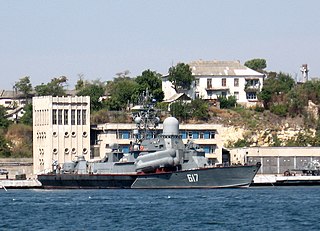
The Battle off the coast of Abkhazia was a supposed naval engagement between warships of the Russian Black Sea Fleet and Georgian patrol boats during the Russo-Georgian War.

Tsezar Kunikov (BDK-64), sometimes anglicised as Caesar Kunikov, is a Project 775, large landing ship of the Russian Navy. The ship was built in Poland, launched in 1986 and named after Soviet Naval Infantry officer Tsezar Kunikov. As part of the Russian Black Sea Fleet, it took part in the KFOR mission, the Russo-Georgian War, the Syrian Civil War, and the Russo-Ukrainian War.
Drone warfare is a form of aerial warfare or marine warfare using unmanned combat aerial vehicles (UCAV) or weaponized commercial unmanned aerial vehicles (UAV). The United States, United Kingdom, Israel, China, South Korea, Iran, Iraq, Italy, France, India, Pakistan, Russia, Turkey, Ukraine and Poland are known to have manufactured operational UCAVs as of 2019.
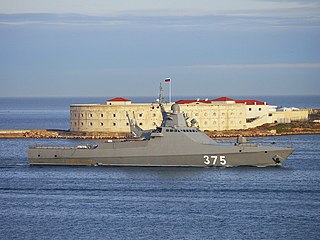
Project 22160 is a series of large patrol ships being constructed for the Russian Navy. The vessels are primarily intended for duties such as patrol, monitoring and protection in open and closed seas. The first ship was laid down in February 2014 and joined the Russian Navy in December 2018. By January 2018, six ships were under construction. Between 2017 and 2022, four ships had been launched.
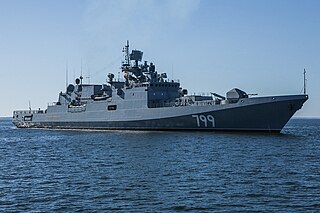
Admiral Makarov is an Admiral Grigorovich-class frigate of the Russian Navy, part of the Black Sea Fleet based at Sevastopol. She was laid down at the Yantar Shipyard in February 2012 and commissioned on 25 December 2017. She is the most recently built of her class, and the third of six ships that had been planned in the class as of November 2014.
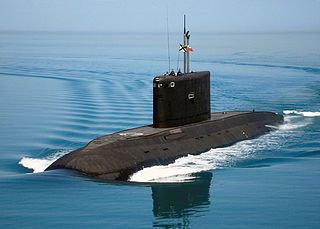
Rostov-na-Donu (B-237) is an improved Kilo–class attack submarine of the Russian Navy. On 13 September 2023 the vessel was struck during a Ukrainian missile attack on the Sevastopol Shipyard where she was under repair. Based on open-source imagery, the UK Ministry of Defence assessed that the vessel "likely suffered catastrophic damage."

During the southern Ukraine offensive of the Russian invasion of Ukraine, the city of Odesa and the surrounding region have been the target of shelling and air strikes by Russian forces on multiple occasions since the conflict began, fired predominantly from Russian warships situated offshore in the Black Sea. The city has also been targeted by Russian cruise missiles.

The Russian warship Moskva, the flagship of the Russian Navy's Black Sea Fleet, sank on 14 April 2022 during the Russian invasion of Ukraine. Ukrainian officials announced that their forces had hit and damaged it with two R-360 Neptune anti-ship missiles, and that the ship had then caught fire. The United States Department of Defense later confirmed this, and Russia reported that the ship had sunk in stormy seas after the fire reached munitions onboard and they exploded.

In February 2022, two days after Russia's full-scale invasion, Ukraine requested American aerospace company SpaceX to activate their Starlink satellite internet service in the country to replace internet and communication networks degraded or destroyed during the war. Starlink has since been used by Ukrainian civilians, government and military. The satellite service has served for humanitarian purposes, as well as defense and attacks on Russian positions.
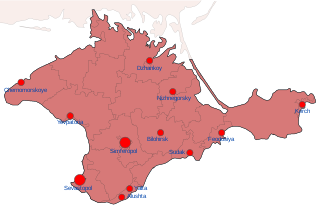
On 27 February 2014, unmarked Russian soldiers were deployed to the Crimean Peninsula in order to wrest control of it from Ukraine, triggering the Russo-Ukrainian War. This military occupation, which the Ukrainian government considers to have begun on 20 February, laid the foundation for the Russian annexation of Crimea on 18 March 2014. Under Russia, the Ukrainian Autonomous Republic of Crimea was replaced by the Republic of Crimea, though the legitimacy of the latter is scarcely recognized internationally.
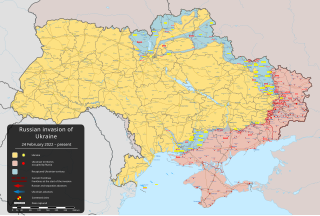
Beginning in July 2022, a series of explosions and fires occurred on the Russian-occupied Crimean Peninsula from where the Russian Army had launched its offensive on Southern Ukraine during the Russian invasion of Ukraine. Occupied since 2014, Crimea was a base for the subsequent Russian occupation of Kherson Oblast and Russian occupation of Zaporizhzhia Oblast. The Ukrainian government has not accepted responsibility for all of the attacks.

Elon Musk is an authorized biography of American business magnate and SpaceX/Tesla CEO Elon Musk. The book was written by Walter Isaacson, a former executive at CNN, TIME and the Aspen Institute who had previously written best-selling biographies of Benjamin Franklin, Albert Einstein, Steve Jobs and Leonardo da Vinci. The book was published on September 12, 2023, by Simon & Schuster.

Sea Baby is a Ukrainian multi-purpose unmanned surface vehicle (USV) developed for use by the Security Service of Ukraine (SBU) during the Russian invasion of Ukraine. It is able to carry an explosive payload for use in kamikaze attacks, or equipped with other equipment loadouts for more specialised use.
References
- ↑ Altman, Howard; Payne, Stetson; Rogoway, Tyler (29 October 2022). "Ukraine Unleashes Mass Kamikaze Drone Boat Attack On Russia's Black Sea Fleet Headquarters". The Drive. Archived from the original on 30 October 2022. Retrieved 29 March 2023.
- ↑ Ozberk, Tayfun (30 October 2022). "Analysis: Ukraine strikes with Kamikaze USVs - Russian bases are not safe anymore". Naval News. Archived from the original on 8 November 2022. Retrieved 29 March 2023.
- 1 2 "Россия заявила об атаке украинских дронов на Черноморский флот в Севастополе. Что известно" [Russia announced the attack of Ukrainian drones on the Black Sea Fleet in Sevastopol. What is known:]. BBC News (in Russian). 28 October 2022. Archived from the original on 29 October 2022. Retrieved 29 March 2023.
- ↑ Gault, Matthew (26 September 2022). "Mysterious Sea Drone Surfaces in Crimea". Vice. Retrieved 10 September 2023.
- ↑ Ozberk, Tayfun (23 August 2023). "Ukraine's new underwater drone Marichka breaks cover". Naval News. Archived from the original on 18 September 2023. Retrieved 12 September 2023.
- ↑ "How Elon Musk's satellites have saved Ukraine and changed warfare". The Economist. ISSN 0013-0613. Archived from the original on 23 September 2023. Retrieved 6 June 2023.
- ↑ Borger, Julian (7 September 2023). "Elon Musk ordered Starlink to be turned off during Ukraine offensive, book says". The Guardian. ISSN 0261-3077. Archived from the original on 13 September 2023. Retrieved 9 September 2023.
- ↑ Marquardt, Alex (13 October 2022). "Exclusive: Musk's SpaceX says it can no longer pay for critical satellite services in Ukraine, asks Pentagon to pick up the tab | CNN Politics". CNN. Archived from the original on 24 October 2022. Retrieved 21 September 2023.
- ↑ Darcy, Oliver (12 September 2023). "An explosive Elon Musk biography is just hitting shelves. But the book's acclaimed author is already walking back a major claim | CNN Business". CNN. Archived from the original on 22 September 2023. Retrieved 15 September 2023.
- ↑ Applebaum, Anne (11 September 2023). "What Russia Got by Scaring Elon Musk". The Atlantic. Archived from the original on 16 September 2023. Retrieved 12 September 2023.
- ↑ "В Севастополе закрыли водную переправу после серии взрывов" [In Sevastopol, the water crossing was closed after a series of explosions]. Radio Free Europe (in Russian). 29 October 2022. Archived from the original on 29 October 2022. Retrieved 29 March 2023.
- ↑ Callaghan, Louise (29 October 2022). "Russian naval base 'hit by massive drone attack'". The Times . ISSN 0140-0460. Archived from the original on 16 November 2022. Retrieved 29 March 2023.
- ↑ Romaniuk, Roman (1 January 2024). "Sea drones, Elon Musk, and high-precision missiles: How Ukraine dominates in the Black Sea". Ukrainska Pravda . Archived from the original on 2 January 2024. Retrieved 3 January 2024.
- ↑ "GeoConfirmed: Беспилотники в севастопольской бухте поразили минимум три российских корабля" [GeoConfirmed: Drones in Sevastopol Bay hit at least three Russian ships]. The Insider (in Russian). Archived from the original on 30 October 2022. Retrieved 29 March 2023.
- ↑ Razvozhaev, Mikhail (29 October 2022). "Жителям Севастополя закроют доступ к трансляциям с камер наблюдения после атаки беспилотников на корабли Черноморского флота" [Residents of Sevastopol will be denied access to broadcasts from surveillance cameras after a drone attack on ships of the Black Sea Fleet]. Meduza (in Russian). Archived from the original on 29 October 2022. Retrieved 30 March 2023.
- 1 2 "Порт Севастополя атаковали беспилотники. Россия обвинила в атаке Украину и Великобританию — и объявила о выходе из «зерновой сделки»" [The port of Sevastopol was attacked by drones. Russia blamed Ukraine and the UK for the attack - and announced its withdrawal from the "grain deal"]. Meduza (in Russian). 29 October 2022. Archived from the original on 29 October 2022. Retrieved 29 March 2023.
- ↑ "Россия бессрочно приостановила "зерновую сделку" с Украиной. Поводом назвали атаку на Севастополь" [Russia has permanently suspended the "grain deal" with Ukraine. The reason was called the attack on Sevastopol]. BBC News (in Russian). 29 October 2022. Archived from the original on 29 October 2022. Retrieved 30 March 2023.
- ↑ Gardner, Timothy; Lewis, Simon (30 September 2022). "U.S. has much to gain from Nord Stream damage, Russia says at U.N." Reuters . Archived from the original on 10 February 2023. Retrieved 30 March 2023.
- ↑ "Росія призупиняє участь в "зерновій угоді". Усе через "атаку" на Севастополь" [Russia suspends participation in the "grain agreement". All because of the "attack" on Sevastopol]. BBC News (in Ukrainian). 29 October 2022. Archived from the original on 29 October 2022. Retrieved 30 March 2023.
- ↑ "How Elon Musk's satellites have saved Ukraine and changed warfare". The Economist. ISSN 0013-0613. Archived from the original on 23 September 2023. Retrieved 6 June 2023.